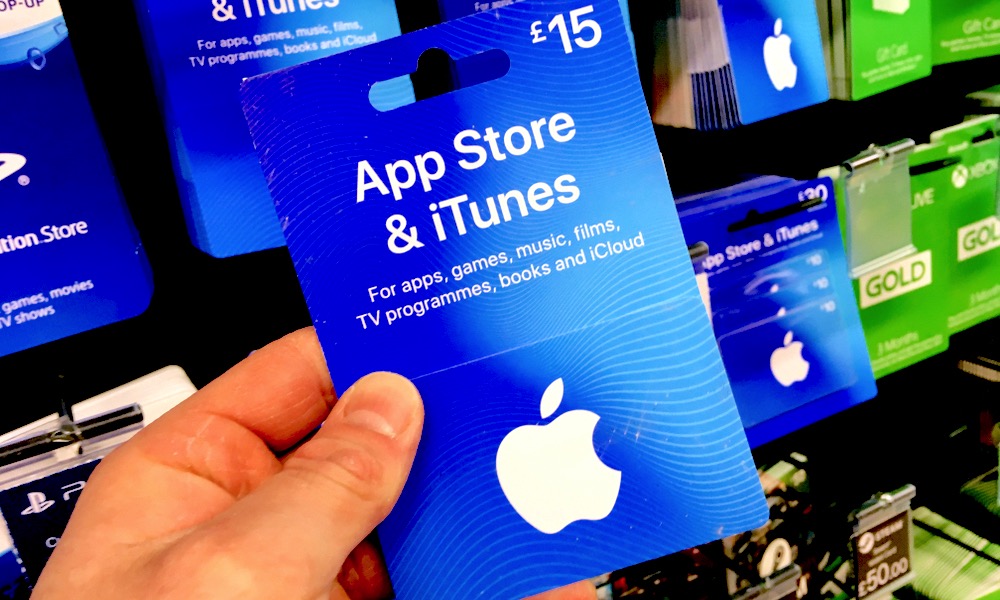Apple Agrees to Settle Gift Card Scam Lawsuit
 Credit: David Cardinez / Shutterstock
Credit: David Cardinez / Shutterstock
Toggle Dark Mode
A 2020 lawsuit that accused Apple of profiting from iTunes gift card scams appears to be close to reaching an out-of-court settlement, according to a new report from Reuters.
The case, which was initially filed on July 17, 2020, accused Apple of violations under California’s Unfair Competition Law, Consumers Legal Remedies Act, and False Advertising Law. It also cited violations of the elder abuse laws in that state since many of the victims were elderly.
Gift card scams have become commonplace in recent years, with criminals calling up unsuspecting victims and duping them into believing they can pay taxes, medical bills, and debts using gift cards rather than cash. Posing as an IRS agent is one common tactic, as the fraudsters can use the fear and panic this instills in many people to make them feel they must deal with the issue immediately or face more serious criminal charges.
In some cases, the scammer will even tell their victim that the police are already on their way and they can only be stopped by immediately providing iTunes or App Store gift card numbers to make payment immediately.
It’s a scam that’s widespread enough that Apple has instructed its employees to advise customers buying gift cards that they cannot be used to pay taxes. Apple has also printed similar warnings on the gift cards themselves and published a specific support article on Gift Card scams:
“Regardless of the reason for payment, the scam follows a certain formula: The victim receives a call instilling panic and urgency to make a payment by purchasing Apple Gift Cards, App Store & iTunes Gift Cards, or Apple Store Gift Cards from the nearest retailer (convenience store, electronics retailer, etc.). After the cards have been purchased, the victim is asked to pay by sharing the code(s) on the back of the card with the caller over the phone.”
However, it seems that some folks who have sadly fallen victim to these scams feel that Apple isn’t doing enough — and that the company may even tacitly be in on the scams since it also profits from them.
The original lawsuit made sweeping assertions, alleging that Apple was a willing participant by “receiving, retaining, withholding, or concealing stolen property” and “aiding and abetting intentional torts.” However, US District Judge Edward Davila dismissed most of those claims in 2022, ruling that there was no evidence that Apple knowingly helped scammers.
However, Judge Davila stopped short of dismissing the case entirely, noting that Apple may have benefited from the scams and wasn’t doing enough to help potential victims. The plaintiffs suggested that this lack of action on Apple’s part was deliberate since it’s receiving a cut through its 30 percent App Store commissions.
Davila ruled that the plaintiffs’ claims that Apple had “direct knowledge” were valid and should be tested in court. After all, they reported informing Apple that they had been scammed and had money stolen, and believed that Apple “is fully capable of determining which accounts redeemed the stolen gift card funds and preventing payout of those funds. However, Apple “nevertheless informed [the plaintiffs] that there was nothing it could do for them despite those Plaintiffs’ prompt notification of the theft.”
Since Apple typically holds funds paid for an app or media item for up to six weeks before paying them out to the developer or rights holder, the complaint also argued that Apple should have ample time to reverse the transaction and issue a refund.
Plaintiffs allege that Apple could have used its knowledge and control of its online stores to suspend Apple ID accounts and Apple Developer accounts associated with suspicious activity, to refuse to pay Apple Developer accounts that seemed to be involved with scams, and to refund to scam victims Apple’s 30% commission on purchases associated with scams (if not the full 100% loss of the stolen gift card value).
Barrett et al v Apple Inc et al, U.S. District Court, Northern District of California, No. 20-04812
However, even if that’s not the case, the plaintiffs argued that Apple should refund the 30% that it withholds since it only pays out 70% to the developer. Instead, the complaint alleges that Apple is keeping “30% for itself as a ‘commission for knowingly converting stolen codes into dollars.”
Judge Davila’s 2022 ruling was only on Apple’s motion to dismiss, effectively letting some of the claims stand and giving them an opportunity to prove the matter in court. However, it appears that Apple has decided to settle the case instead of allowing it to proceed to trial, according to a San Jose federal court filing on Wednesday. Apple’s lawyers and the plaintiffs have been working through a mediator and are said to be drafting a formal settlement that will be presented to Judge Davila for preliminary approval.
It’s unclear what the settlement will mean for those who have fallen prey to gift card scams, but the class-action lawsuit encompassed anyone in the US who “bought gift cards redeemable on iTunes or the App Store, provided codes to fraudsters, and did not receive refunds from Apple,” between 2015 and July 31, 2020.






